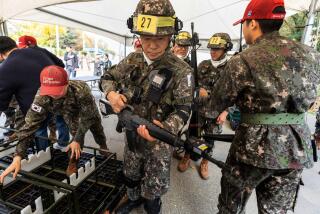40 Years After an Ambiguous End, ‘Forgotten War’ Is Remembered : Asia: Korean War is heralded as an example of the need for military preparedness. Others give it credit for paving the way for victories in the Cold War and Gulf War.
- Share via
They call it the Forgotten War--a nasty conflict swept under the rug of history, a postscript to the total victory of World War II and a precursor to the anguish of Vietnam.
But finally, 40 years after a July 27, 1953, armistice brought the fighting to an ambiguous end, the Korean War is being remembered.
U.S. commanders cite it as an example of the need for military preparedness. Historians point to it as a bedrock chapter in winning the Cold War. And a President who was just 6 years old when the fighting ended has underscored the war’s lessons.
“Vulnerability invites aggression; peace depends upon deterrence. We cannot forget those lessons again,” said President Clinton, who this month became the first President to visit the demilitarized zone--a 155-mile-long no-man’s-land that endures as the world’s most fortified border.
When Harry S. Truman ordered U.S. ground troops to Korea without obtaining congressional authorization, he called it a police action and told his closest advisers, “We’ve got to stop (them) no matter what.”
But demobilization had made the Army a hollow shell of the war machine built during World War II.
In the first U.S. battle, 540 ill-trained and ill-equipped troops under Lt. Col. Brad Smith dug in against the Soviet-made tanks of the 90,000-man North Korean army. Without tanks, mines, armor-piercing artillery shells or effective bazookas, the task force was overwhelmed by the invaders.
The soldiers who followed in their tracks were drawn from a U.S.-led coalition of 16 nations--the first time the fledgling United Nations sent an army into the field to combat aggression.
The defenders were nearly pushed off the Korean Peninsula, then turned the tide with a Marine landing at Inchon, history’s last great amphibious assault. The allies then decided to cross the 38th Parallel and unify the country under one flag.
Pyongyang was taken--the only Communist capital ever to be liberated by the West. And elements of the U.S. 7th Division even made it to the Yalu River.
But Communist China entered the war, driving the U.S. Army back on a 275-mile retreat, the longest in its history. The 1st Marine Division fought its way out of a trap at the Chosin Reservoir, where temperatures were minus-30 degrees.
Ultimately, the Americans rallied and drove the Communists out of South Korea again before peace talks began.
Despite U.S. air and naval superiority, it took two years of stubborn talks before the bloody fighting stopped on outposts named Heartbreak Ridge, Pork Chop Hill and other hilltops that recalled the trench warfare of World War I.
The final line was essentially the same point where the war began. But by that time, more than 50,000 American lives were lost.
That the military has learned from Korea was apparent in the Persian Gulf, when a U.S.-led coalition under the U.N. flag ejected the Iraqi army from Kuwait, concentrating its muscle instead of committing units piecemeal.
“We’ve learned to go in with overwhelming power and a game plan that’s winnable,” said retired Col. David Hackworth, a military analyst who saw combat in Korea and Vietnam.
“Korea was a sideshow of what became Vietnam. Every mistake there was made in spades in Vietnam. The objective was never clear. The strategy changed from general to general,” Hackworth said.
The war boosted Japan’s recovery from World War II defeat--Nissan, Toyota and Isuzu factories repaired U.S. trucks and vehicles. South Korea also was transformed. A maker of wheat and sugar products called Samsung is now an electronics giant.
A hair-trigger truce separates North and South Korea. The two nations have never signed a peace treaty, so a state of war still technically exists.
The armistice was accepted as a stalemate, the first war America didn’t win.
More to Read
Sign up for Essential California
The most important California stories and recommendations in your inbox every morning.
You may occasionally receive promotional content from the Los Angeles Times.













